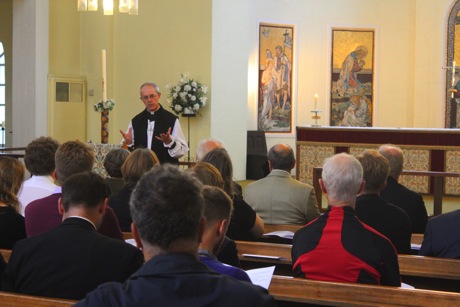 On September 29th, Archbishop Justin Welby commissioned 45 new Credit Champions from churches across the UK, at St George-in-the-East. Our Church Credit Champions Network is part of the Archbishop’s initiative on responsible borrowing and saving.
On September 29th, Archbishop Justin Welby commissioned 45 new Credit Champions from churches across the UK, at St George-in-the-East. Our Church Credit Champions Network is part of the Archbishop’s initiative on responsible borrowing and saving.
Here is some of what he had to say…
“Here we are for the commissioning of the Credit Champions. It’s humbling to see that because it is a movement of God’s Spirit among us.
To those of you who are shortly going to be commissioned as Church Credit Champions, you have heard God’s call, as the whole church has in recent years, to be a church of the poor for the poor; to seek justice and the common good for all in our society. You have set up credit union access points in your churches, brought new people onto the boards of local credit unions, supported people struggling with debt through signposting them to debt advice resources. You have seen the need, and you have met it with love, grace and hope.
We all know that the Christian relationship with money is, at best, slightly ambivalent. We recognise when it’s got the wrong place, but we find it quite hard to find the right place. In 2006/07 it was clear that the forces of finance had become the dominant power in our society. That the way the economy was working depended on individuals borrowing more and more to spend more and more, and keep the whole thing churning.
And so when money, as it always does, having promised that it will look after us ever so well, turns out to be a cruel slave master, and particularly for the poorest in society, a slave master of the upmost cruelty that binds people in chains, that takes away their hopes, takes away their homes, takes often away their families, damages them at the most profound levels.
There was this sense that we were just getting our head above water and suddenly someone has raised the water line. It is the people on the edge who always suffer the most, the ones who simply can’t afford that extra few pounds a month, or the ones who find that they end up with payday lenders where it’s not an extra few pounds a month but a cumulative growth of pounds that brings them to near despair.
Scripture is full of advice about money. Exodus 22:25: “If you lend money to one of my people among you who is needy, do not treat it like a business deal; charge no interest.”
Deuteronomy 23:19-20: “You shall not charge interest to your countrymen: interest on money, food, or anything that may be loaned at interest. You may charge interest to a foreigner, but to your countrymen you shall not charge interest, so that the LORD your God may bless you in all that you undertake in the land which you are about to enter to possess.”
In other words, the use of money to make money for most of history has been seen as a dangerous process. And so it goes on, there is an ambivalent attitude to money.
The reading we had from Revelation 5 has at its heart the idea that the hardships of life as we experience and live them blinds us to the reality of God who is faithful, who liberates, and in the end will save. One of the things that are seen in Revelation, and the apocalyptic works in the Old Testament, as controlling people habitually is the power of money and the economy.
So how do we respond to that as Christians today? Where do we find the liberation that we are looking for, that enables money to be the good servant it should be and not the bad master that we have experienced, particularly in the last seven or eight years.
I want to raise three particular points. The first one is responsibility. The Church Credit Champions are about enabling people, helping people to find for themselves the limits of what they should and should not do. As Champions, there is a responsibility to help people think about their relationship with money.
Our individual relationship with money is intensely complicated and difficult. We ascribe value to people on the basis of their money. We often forget that people with no money are equally valuable to God – often more valuable to God – than those who have huge sums of money. And we forget that money is often something that promises to help us but ends up ruling us.
So as Champions I urge you first of all, picking up some of the themes behind that earlier reading in Revelation, to point to true liberation, giving people the freedom to see what they are worth in God’s eyes and what they are worth in the world’s eyes and how you see them. And they will understand what they are worth in God’s eyes by what they seem to be worth in your eyes. How you value them will transform their own understanding.
The second point is about what Pope Benedict called gratuity, or what we might call grace or generosity. Gratuity is a core principle of understanding how finance becomes part of the common good. Gratuity is grace in action. A combination of responsibility and gratuity says to money, ‘I recognise your importance. I have a responsible attitude towards you. And I’m going to demonstrate my mastery of you by not squeezing every cent that I can get.’
The responsibility, the gratuity, the mastery of money, is about the focus of our vision. By this I mean that we’re assured in how and why money is being loaned, but at the level of which this network of Credit Champions is going to operate.
It’s been very promising in the pilot project that it has focused very heavily on the local, which is where it should be. It’s about changing people in the most local area. And where we do that, when money is turned into a servant – this is the change for which we have to pray – and actually serves people, it releases what God has given us in creativity.
The analysis suggests that the network has already generated over £800,000 of value in society, through the interest saved by people borrowing from credit unions rather than high-cost credit providers, and by encouraging more local volunteering. Over the whole pilot period, the network is projected to generate about £2 million in community benefit.
Where does it start? It starts with this in Revelation 5: when nothing is happening, when nobody can open the scroll, what do they find when they open the scrolls? A lamb. The person of Jesus Christ. A helpless figure on the cross. The body that disappeared from the tomb, whose whole life spoke of the infinite value of those he loved.
And when you channel that love of Christ into the lives of individuals in practical action around the mastery of money, and bringing it into servitude, there will be the most dramatic changes.
It is really a privilege to be with you today, to be celebrating what we’ve already achieved and to have the honour and blessing of being able to commission you to continue this work. Thank you for what you’re doing. Amen.
This text has been adapted from the Archbishop’s full sermon, which can be found here or you can watch a video here. You can find out more about the work of the Church Credit Champions Network here. For any questions about how you can get involved contact David Barclay on davidb@theology-centre.org


Leave a Comment